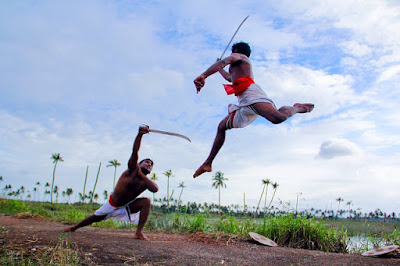BERIPAT-BEREGONG CEREMONY
Long ago, there lived a beautiful
girl in a little village. She was the most beautiful among the
village girls. A lot of young men hoped they would be lucky enough to
have a wife like her. Besides, there were many young men coming from
other villages and they wanted to make friends with that fairylike
girl.
As there were too many marriage
proposals, the parents were hard to decide which handsome guy was the
best for their daughter. They also knew that most of the suitors had
good self defense techniques and inner power.
Many of them demonstrated their
skills. Some were able to cut down a big tree with their palms or
burned it with their inner power and others could shoot a boar with
their fingers.
The parents then proposed a rattan
stick contest. The contestants should hit each other with rattan
sticks. One would lose if he was hit on the back by his challenger.
Then what would happen if both of them got hit on their backs? In
that case, the winner would be the one who got fewer strikes.
When the day came, all the young men
who were ready for the contest gathered in a circular area. People
from other villages also came to see what was going on.
All the heroes were dancing around
while the music of gongs, drums and flutes began.
If someone shouted: “Ini die
no’ri Datuk, cube pute!” (Yeah, I’m from Datuk
village, please fight me!), the other man might reply: “Ehhh….
Begaye amat! Nih ku hajar baru tahu!” (Ehhhh…, proud man. Let
me teach you a lesson.)
Each of them was dancing around
seeking his rival. Then, both went in the ring. One of them tapped on
his rival's shoulder and asked: “Kiape re?” (What about
you?). Then the rival answered: “Tulai.” (It’s OK)
The contest ended in a draw because
all the contestants possessed excellent self defense arts.
This is all about the story of
beripat-beregong. Nowadays, people seldom perform this ceremony as it
is hard to fulfill all the requirements, such as ritual offerings, a
stage of 6 or 7 meters high and its ladder. It’s for the performers
who play the traditional music. It should be under the guidance of a
shaman to load musical instruments on the stage.
The ceremony is led by a village
shaman, a referee and an assistant recording the fight. This ceremony
is performed in the evening. All the participants are dancing while
the traditional music starts. If one has found his rival, they go to
the shaman. The shaman will ask whether they know each other because
it isn’t allowed to fight with the competitor from the same
village.
Both participants take off their
clothes, their left hands are wrapped with thick cloth for repulsing
the rival’s attacks. They also cover their heads and ears with
cloth.
Before the ceremony begins, the
shaman explains to the participants that they aren’t allowed to
hit each other’s head and lower part of the body. The strike on the rival’s
back is legal. The rattan sticks of both participants should be
examined and have the same length.
The shaman rubs the sticks with magic
water to prevent the participants from getting hurt if they are hit
by the rattan sticks. However, they’ll feel pain at home. Soon
afterwards, the two participants go into the ring and both of them
receive a shower of loud applause.
All the dancers should leave the ring before the two gentlemen start the game. They stand face to
face with a gentle manner (something like cowboys in a movie while
they are preparing gunfire). They shake hands and say: “Kite
kan Cume main-main, ndak ade dendam ape-ape.” (We’re just
playing and there won’t be any grudge or hatred). The other says:
“Ndak ape-apelah, sidak ngempok dulu.” (It’s OK, you
strike first).
Later, the two men start hitting each
other. The sound produced by the heavy strikes of rattan sticks is
very scary. But both of them keep winning the applause of the
audience.
The referee will stop the match
after it has been taking place for quite a while. If you are not
trained and capable enough, you’ll be seriously wounded.




Some couples prefer to have a small and intimate wedding ceremony, and then follow that with the mother of all parties in the evening. If this is your plan, be sure that the wedding venue can accommodate this.
ReplyDeleteshubha mangal marriage bureau
This marriage type can be called a love marriage also, where the bride and groom marry without the permission of their parents. This was not considered the right kind of marriage as per the old believes and concepts, but now the times are changing and love marriages have started getting accepted by the people of India.
ReplyDeletepremium matrimon